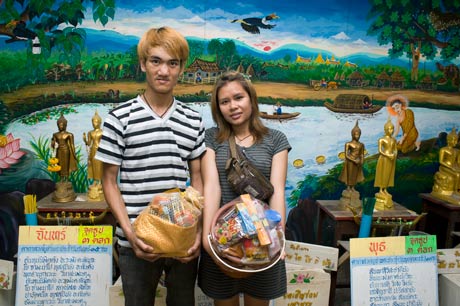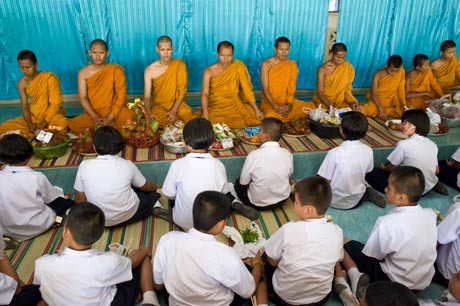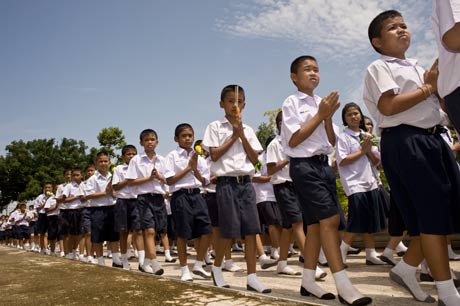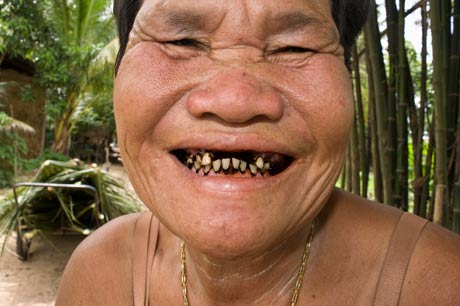Letter from Thailand – I am a farang
I am a farang
All my friends went back to Bangkok and then home – all the farangs (Thai word for someone of European ancestry, no matter where they may come from) – except for me.
I stayed in the village of Nong Diang Noi Non Yai, the village where the wedding was celebrated. I stayed with the groom’s family. There were six of us; aunt and uncle, their two daughters, one still a schoolgirl, the second married, her husband, and I. Everybody only spoke to me in Thai, not realizing I do not speak it. I spoke to them in English, realizing they do not speak it.
Nong Diang Noi Non Yai village is near the town of Kantharalak, in Isaan province. It and all of Isaan is a breath of fresh air in all senses. It is Thailand’s poorest and most ignored province, which means no-one speaks English, and no-one offers you banana pancakes or tourist tat.
The family, after a long time persuading them that I do not want to drive around on a motorbike but by bicycle, brought me one morning an old one with no brakes, though they made me very, very happy. I could peddle across a vast landscape, between rice fields and stop anytime I wanted to photograph people going about their everyday business. Business as they have done for centuries: growing rice, fishing, weaving silk, catching ant larva, making brooms and charcoal and grazing cows and buffalos.
Growing rice
In May before the raining season farmers at the Rocket Festival launched rockets to implore the God of Rain to shower the earth with abundant rainfall for the planting season. The Rocket Festival is an integral part of pastoral life as without enough rainfall crops will not grow. The majority of Isaan people are farmers even though the Isaan soil is poor.
So, after all the rockets were fired into the sky and rain-making rites and other ceremonies to pray for fertility of the land were done, the rice-planting season started.

Rice seeds are planted before ploughing; then again after soil is ploughed just to be sure some rice seeds will catch on and will grow.
While flooding is not mandatory for cultivation of rice, all other method of irrigation require higher effort in weed and pest control during growth periods and a different approach for fertilizing the soil.
Unfortunately I could not find out what kind of chemicals these farmers use, or if it is fertilizer or weed killer. Whatever it is, it makes me always think when I ate rice (mostly 3 times a day) that chemicals are used helping rice grow. There is no distinction between the dishes eaten for breakfast, lunch and dinner. Spicy stir fried vegetables with sticky rice are just eaten in the morning as in the evening.
Fishing
To supplement their income women often make fishnets by hand and men do all fishing.
Not only fish are caught but also frogs, ant’s larva, snakes and many types of insects. These and fish can be sold in the market or consumed by the family – the catch is an important sort of protein.

An elderly couple collecting charcoal they made. Gas is used for cooking in most towns, but villagers usually use charcoal or firewood.
Euro 2012 started, but no one was interested in “my” village. They watched on TV Muy Thai or Thai Kickboxing, Thailand’s ancient martial art. It is known as the “Art of Eight Limbs” and is the national sport of Thailand. I went once to see it live, where all categories, from children to adults fought.
I also participating celebration of Visakha Bucha Day or the Buddha’s Birthday or Buddha Day. It isthe most holy time in the Buddhist calendar; it commemorates the birth, enlightenment and the passing away of Gautama Buddha the founder of Buddhism. Students in Kantharalak visited Buddhist Vat on Friday, three days before the D-day. They brought food and sweets for monks and they prayed. After prayers they went around the temple three times.
For the D-Day I was in Bangkok because I had to go to the Indonesian Embassy to apply for a visa. I went to Suwan Buddhist Vat where people brought gifts to Monks, where they prayed, and where they were given gifts from monk as well.

Thai couple poses for a photo in Suwan Vat on the Visakha Bucha Day on June 4th. They hold baskets full of gifts to monks.
You must already feel my Thailand trip is at the end. I got the Indonesian visa and on June 14th I am off to Banda Aceh, Indonesia through Kuala Lumpur, Malaysia.
I should still mention that I wanted to photograph buffalos, an animal that is very photogenic. But I was afraid to go closer to it, and not having a zoom but just 20mm and 28mm lenses, there is no closer shot of this magnificent animal. Most farmers use the plowing machine, which replaced buffalos. It acts as a tractor and pulls a trailer. The iron-spike wheels can be changed for tires.
What else should I say. Yeah, the Isaan kitchen is much hotter than Thai kitchen. So first Isaan dishes drove tears into my eyes. When I, by accident, ate chili pepper, the family died of laughter while I was screaming like a lion into the air.
I should still mention that mostly elderly woman chew “betel” – areca nut wrapped in betel leaves, called by local’s “mak”. It had driven me crazy when an auntie spat her betel juice out. Red colour saliva looked like splotches of dried blood on the ground.
The young people find betel chewing no longer socially acceptable. Also modern social taboos such as spitting, have contributed to the decline of betel chewing. Despite a decline in the custom, the betel chewing still remains in country-side areas, where it’s use for medical and cultural purposes, and where women chew betel for social affability, in a similar way to us farangs drinking coffee together.
I must say good-bye to Buddha and hello to Allah so I am off to Indonesia, the biggest Muslim population it the world.





















